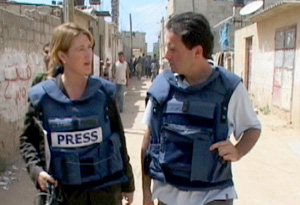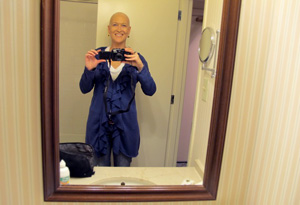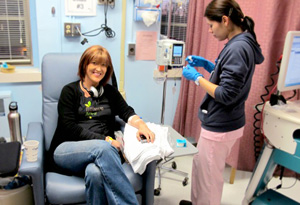Entering the Cancer War Zone

Photo: Fox News Channel
As a Fox News war correspondent, Jennifer Griffin spent years covering conflict in the Middle East. From land mines in Afghanistan to suicide bombings in Gaza, Griffin was no stranger to war zones—but last year, she entered an entirely new battle. At age 40, Jennifer was diagnosed with Stage 3 triple negative breast cancer. "I've put on body armor before and covered stories," Griffin says. "I never thought the greatest danger to my life would come from inside of me."
Since her diagnosis in October 2009, Griffin has been candidly blogging about her fight with cancer. What started as a way to keep family and friends updated has turned into a support system for the people across the country who read it. "I don't recommend secrecy," she says. "Tell your friends, tell your children, tell the school right away. Children can handle this information; they take their cue from you."
In her first entry, she blogs about the visualization exercise she uses to mentally fight the war within: "I'm the Commander in Chief. Al Qaeda cells have taken over parts of my body, and I have signed the Execute Order and sent in the Navy Seals with a shoot to kill order."
To describe cancer as a war zone is a fitting analogy; triple negative is aggressive and fast-acting. "It's the kind of cancer that grows in between mammograms," Griffin says. In general, this type of breast cancer has one of the worst survival rates.
However, a diagnosis of triple negative is not hopeless—Griffin was treated with 17 rounds of chemotherapy and an experimental drug called carboplatin, which is normally used to treat colon cancer. She was given a complete pathological response—meaning she is now cancer-free.
Fighting Back with Diet and Exercise
Griffin wanted her immune system to be as strong as possible so that she would get the maximum benefit from chemotherapy. "My plan of attack was to control everything that was going into my body," she says. "I made sure I had a very detoxed, clean diet." Some of the nutritional changes Griffin made included removing processed foods from her diet, eating cancer-fighting foods like broccoli and cabbage and cutting out alcohol completely.
Read about the cancer-fighting foods Griffin swears by.
Turning a new leaf and opting for a healthy lifestyle isn't just for cancer patients—Griffin says it's vital for everyone. "We all have cancerous cells in us," she says. "It's a question of whether they go haywire or not. The question is whether your immune system can sweep them away or whether you have a broken gene that then allows something to click. If your system gets overwhelmed with toxic food, environmental factors or stress—that's what allows cancer to grow."
Since her diagnosis in October 2009, Griffin has been candidly blogging about her fight with cancer. What started as a way to keep family and friends updated has turned into a support system for the people across the country who read it. "I don't recommend secrecy," she says. "Tell your friends, tell your children, tell the school right away. Children can handle this information; they take their cue from you."
In her first entry, she blogs about the visualization exercise she uses to mentally fight the war within: "I'm the Commander in Chief. Al Qaeda cells have taken over parts of my body, and I have signed the Execute Order and sent in the Navy Seals with a shoot to kill order."
To describe cancer as a war zone is a fitting analogy; triple negative is aggressive and fast-acting. "It's the kind of cancer that grows in between mammograms," Griffin says. In general, this type of breast cancer has one of the worst survival rates.
However, a diagnosis of triple negative is not hopeless—Griffin was treated with 17 rounds of chemotherapy and an experimental drug called carboplatin, which is normally used to treat colon cancer. She was given a complete pathological response—meaning she is now cancer-free.
Fighting Back with Diet and Exercise
Griffin wanted her immune system to be as strong as possible so that she would get the maximum benefit from chemotherapy. "My plan of attack was to control everything that was going into my body," she says. "I made sure I had a very detoxed, clean diet." Some of the nutritional changes Griffin made included removing processed foods from her diet, eating cancer-fighting foods like broccoli and cabbage and cutting out alcohol completely.
Read about the cancer-fighting foods Griffin swears by.
Turning a new leaf and opting for a healthy lifestyle isn't just for cancer patients—Griffin says it's vital for everyone. "We all have cancerous cells in us," she says. "It's a question of whether they go haywire or not. The question is whether your immune system can sweep them away or whether you have a broken gene that then allows something to click. If your system gets overwhelmed with toxic food, environmental factors or stress—that's what allows cancer to grow."

Along with a healthy diet, Griffin says exercise—mainly Pilates—helped her get through treatment. "They have made such strides in terms of anti-nausea medicine," she says. "I exercised almost every day through chemo." On days when exercises seemed impossible, she still got up and took a long walk. "You really have to treat this as a psychological battle," she says. "It's no different than a soldier deploying to Afghanistan. ... He has his family supporting him just like I had my family supporting me, but you still go into it with a soldier's mentality."
Griffin's Body Armor: Her Lipstick and Wig
A chemotherapy patient's hair is expected to start falling out by Day 17 of treatment. That day never came for Griffin because she chose to take matters into her own hands. "A few girlfriends and my 7-year-old daughter and I went to my favorite hairstylist at the Four Seasons, and he shaved my head," she says. "It was a little bit emotional, but it was also very empowering. I recommend that to all women—shave your head before the hair starts falling out, because it's very debilitating. You don't want to be a victim of this hair coming out and start to look sickly. People tell me 'You didn't look sick through this entire process.' Well, I certainly did while I was in my bathroom in the morning, but I took a little extra time. If I took the time to put on a little lipstick and draw in my eyebrows, I could tell the difference."
When she walked around town without any makeup on, Griffin says people's eyes would dart away. "I could tell they felt so sorry for me," she says. "And that is not the way you want to feel when you're going through this process. You want to feel large and in charge. You want to feel like G.I. Jane. You want to shave your head, and you want to learn how to rock a wig."
One of Griffin's tips: Don't treat a wig as a sign of sickness. "I can tell you one thing: Nobody in Hollywood is wearing their own hair," she says. Griffin made an event out of wig shopping with her twin daughters and dubbed one of her long, brown wigs "The Miley Cyrus." A short, edgy red wig with blonde streaks became Griffin's Josie and the Pussycats look. "It was funky," she says. "I had never been a redhead before, and people loved that wig."
Griffin's Body Armor: Her Lipstick and Wig
A chemotherapy patient's hair is expected to start falling out by Day 17 of treatment. That day never came for Griffin because she chose to take matters into her own hands. "A few girlfriends and my 7-year-old daughter and I went to my favorite hairstylist at the Four Seasons, and he shaved my head," she says. "It was a little bit emotional, but it was also very empowering. I recommend that to all women—shave your head before the hair starts falling out, because it's very debilitating. You don't want to be a victim of this hair coming out and start to look sickly. People tell me 'You didn't look sick through this entire process.' Well, I certainly did while I was in my bathroom in the morning, but I took a little extra time. If I took the time to put on a little lipstick and draw in my eyebrows, I could tell the difference."
When she walked around town without any makeup on, Griffin says people's eyes would dart away. "I could tell they felt so sorry for me," she says. "And that is not the way you want to feel when you're going through this process. You want to feel large and in charge. You want to feel like G.I. Jane. You want to shave your head, and you want to learn how to rock a wig."
One of Griffin's tips: Don't treat a wig as a sign of sickness. "I can tell you one thing: Nobody in Hollywood is wearing their own hair," she says. Griffin made an event out of wig shopping with her twin daughters and dubbed one of her long, brown wigs "The Miley Cyrus." A short, edgy red wig with blonde streaks became Griffin's Josie and the Pussycats look. "It was funky," she says. "I had never been a redhead before, and people loved that wig."

Triple negative has a high risk of recurrence, so Griffin had a double mastectomy. "I was really nervous going into the surgery," she says. "There were women who said, 'Oh, you're going to feel down for six weeks, two months.'"
Griffin's breasts were reconstructed immediately following her mastectomy—and her reaction was far different from what she expected. "When you look down and you see these great, voluptuous mounds, it's not as psychologically debilitating as it was for women 10 years ago who were getting the radical mastectomies." And the best part for Griffin? "My breasts are so perky, they say I never have to wear a bra again," she says. "There's a silver lining to all of this."
Although Griffin is cancer-free, the fight isn't over yet and she is currently undergoing six weeks of radiation therapy. "Right now, I don't have any sign of cancer, but I still need the radiation because these cancers are so tricky and they return and they hide," she says. "I feel a little bruised after a long fight this year, but I'm resetting my sights on this last six weeks. It really is mind over matter."
For women in a similar situation, Griffin's biggest piece of advice after being diagnosed is to do your research. "Do not trust one doctor," she says. "I love my doctors, and my team of doctors saved my life—but I double-checked. I researched things myself. I got a PhD in cancer by the end of this."
For anyone not in her situation, Griffin says to schedule a mammogram now if you haven't already done so this year—and to demand that doctors find a better way to screen for breast cancer while women are pregnant and nursing. Griffin began getting mammograms at age 30, but her tumors grew while she was nursing and remained undetected until one was the size of an orange. "I get emails from other women who are the same age as me, with small children, who were diagnosed," she says."We have to find a way to screen."
Do you have a story like Griffin's to share? Please leave your comments below.
Get Griffin's 11 tips to getting through chemotherapy
Griffin's breasts were reconstructed immediately following her mastectomy—and her reaction was far different from what she expected. "When you look down and you see these great, voluptuous mounds, it's not as psychologically debilitating as it was for women 10 years ago who were getting the radical mastectomies." And the best part for Griffin? "My breasts are so perky, they say I never have to wear a bra again," she says. "There's a silver lining to all of this."
Although Griffin is cancer-free, the fight isn't over yet and she is currently undergoing six weeks of radiation therapy. "Right now, I don't have any sign of cancer, but I still need the radiation because these cancers are so tricky and they return and they hide," she says. "I feel a little bruised after a long fight this year, but I'm resetting my sights on this last six weeks. It really is mind over matter."
For women in a similar situation, Griffin's biggest piece of advice after being diagnosed is to do your research. "Do not trust one doctor," she says. "I love my doctors, and my team of doctors saved my life—but I double-checked. I researched things myself. I got a PhD in cancer by the end of this."
For anyone not in her situation, Griffin says to schedule a mammogram now if you haven't already done so this year—and to demand that doctors find a better way to screen for breast cancer while women are pregnant and nursing. Griffin began getting mammograms at age 30, but her tumors grew while she was nursing and remained undetected until one was the size of an orange. "I get emails from other women who are the same age as me, with small children, who were diagnosed," she says."We have to find a way to screen."
Do you have a story like Griffin's to share? Please leave your comments below.
Get Griffin's 11 tips to getting through chemotherapy



